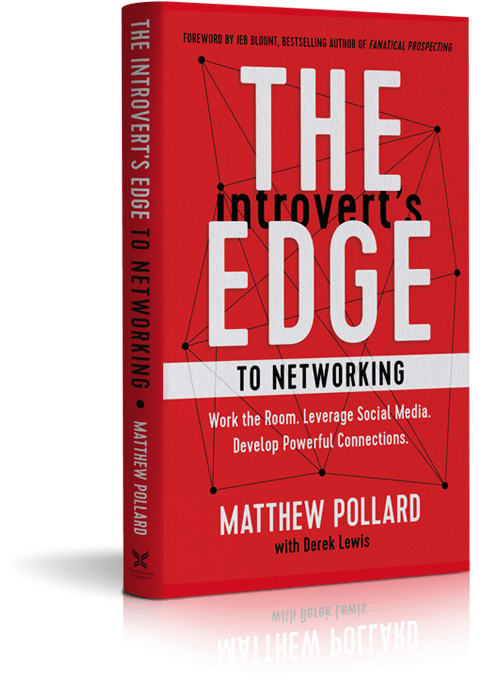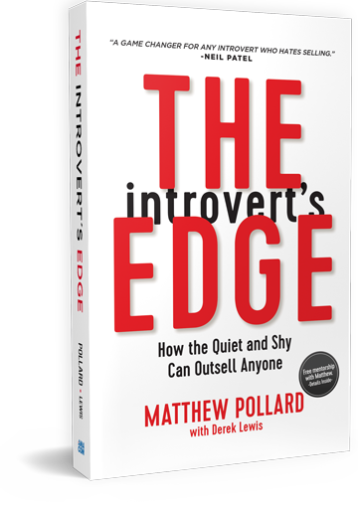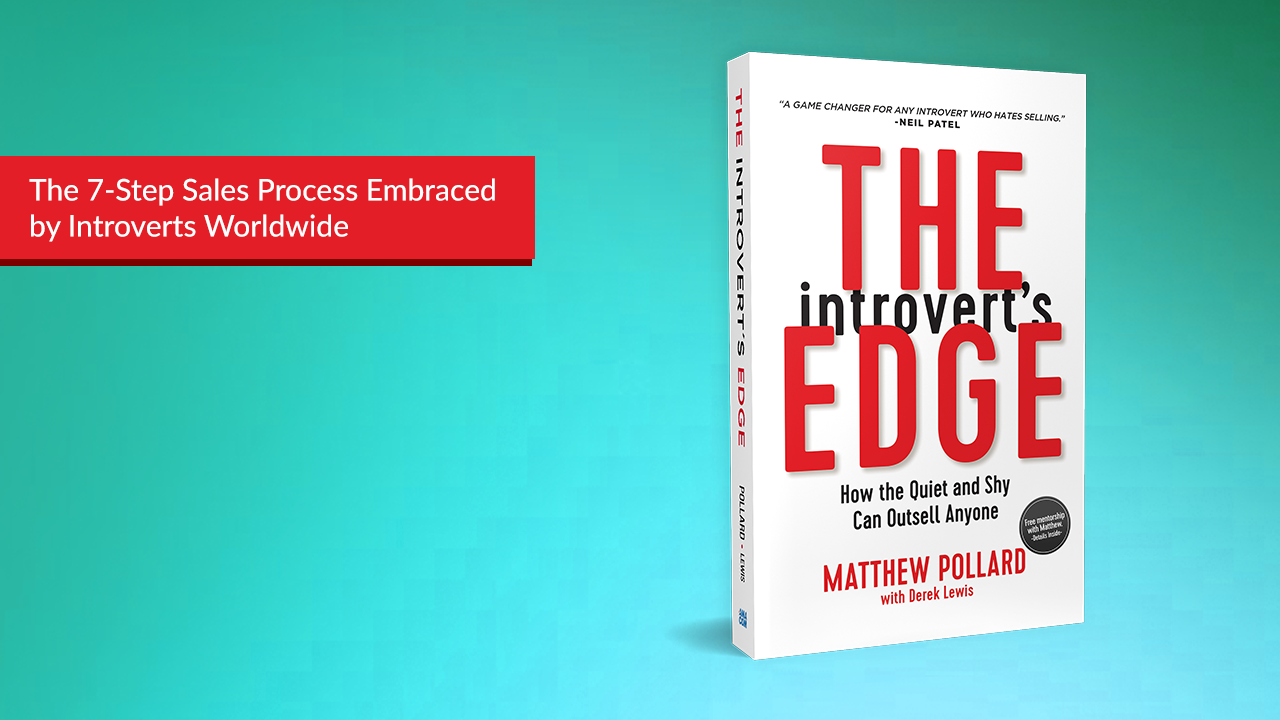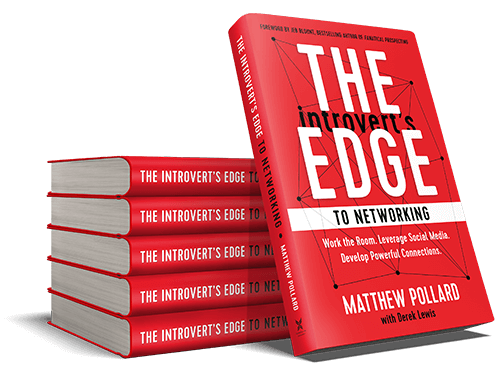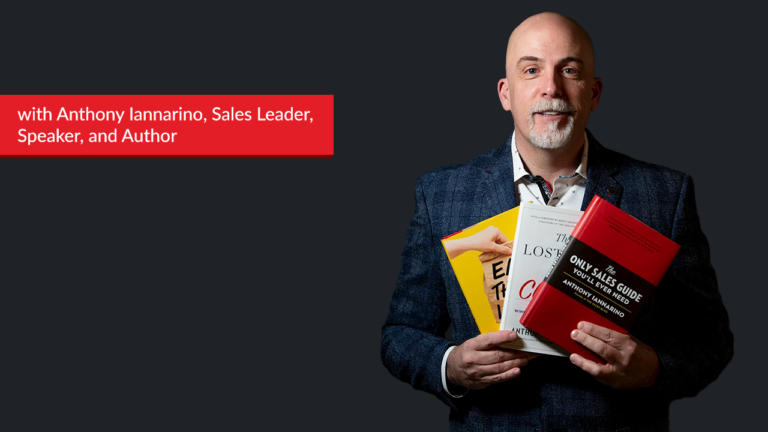Matthew Pollard: Hello, everyone, and welcome back to the Introverts Edge podcast. My name is Matthew Pollard and as always, I’m your rapid growth guy. Now, today I’m going to do something very different. So I’m going to spend today focusing on showing you not only that you can sell as an introvert, but the exact process to follow to double your sales in the next 60 days.
Now, how I’m going to do that is I’m going to give you as part of this audio the first chapter of my first book, The Introverts Edge. Now, my publisher hates me when I say this, but you do not need to buy my book to learn the sales process. What you need to do is listen to the first chapter that I’m going to give you in this audio recording.
Because if you do nothing more, then listen to that first chapter. Firstly, I’ll get you past your belief that you can’t sell as an introvert and show you why you actually have the edge. And then what I’ll do is I’ll outline the seven steps to a successful sales process. If you do nothing more than look at what you currently say and fill it in to those seven steps.
Firstly, you realize there’s a bunch of things that don’t fit. Throw that out. You shouldn’t be saying that to customers. Then you’ll realize there’s a whole bunch of things out of order. Fix that and then you realize this. Some gaping holes fill those holes in. If you do just that in the next 60 days, you will double your sales success.
See, I don’t want you to have to buy my book to get this success, and that’s why I’m going to let you listen to this totally for free today. My book, though, is in 16 languages and has sold over 75,000 copies. And I only tell you this so that you know that this system in this first chapter will work for you.
So let’s get into the first chapter and let me break down the seven steps to the sale for you. Remember, have your pen and pad out or be ready to write them down as well as be ready to believe that you as an introvert can outsell your extroverted counterparts hands down. Okay, let’s get into the audio.
Narrator: Chapter one. When introverts fail at sales in the modern world of business, it is useless to be a creative, original thinker unless you can also sell what you create. David Ogilvy Confessions of an Advertising Man. Alex Murphy’s dream come True was fast becoming a nightmare with financing from two family members he had set up his own videography studio, professional grade cameras, cutting edge software, boom mics, an impressive roster of talent, Golden Arm media had everything going for it except sales as the owner and face of the business that fell to Alex.
Unfortunate Snerdley, like many people who begin with subject matter expertise and then create a business out of it, he didn’t have a knack for sales. In fact, as an introvert, he kind of hated it. After junior high, he developed a pronounced stutter, resulting in a lack of confidence since he was already somewhat shy. This only increased his natural aversion to casual conversations with strangers, his discomfort with the social situations persisted through high school and college as well.
Fast forward a few years to Alex, starting his videography business from scratch. It wasn’t an established business with an existing customer base. He didn’t come out of another business with a portfolio of client projects or an extensive network of people and businesses to tap. He had to build his client roster from the ground up. So if we’re taking inventory, a natural introvert with a stutter made worse during times of stress with an aversion to creating small talk, a natural trait of introverts, a skewed self-perception, and the lowered self-confidence resulting from it, who faces the challenge of forming new relationships that comes from all those factors?
Puts himself in a situation where his livelihood depends on being able to sell intangible services to complete strangers. Sounds like a recipe for disaster, doesn’t it? It was when he got on the phone or in front of potential clients. He didn’t know what else to talk about, but videography and business. If they tried to make small talk or if they happened to share something personal, Alex would just simply clam up.
There was a long, unnatural pause while both sides figured out how to get out of the conversational sand trap but somehow stumbled into. We often say people do business with people they like. Having spent hours with Alex myself, I know he’s a likable guy, but in a sales situation, he had a hard time getting over the hurdle of creating basic rapport with a potential client, much less establishing the necessary trust to persuade them to buy a customized professional service like videography.
So sales sucked. The problem with introverts. We introverts live in a world, or at least in Western culture, that looks up to people who act like extroverts. We often describe the leaders we admire as outgoing, charming and charismatic. Successful people look and act extroverted. Therefore, extroverts are the people we believe we should model. That doesn’t work for introverts like you and me.
It goes against who we are, how we’re wired, and how we think. Sure, we can pretend to be extroverts and learn the tricks at Moscow introversion, but at the end of the day, we can’t escape our DNA. Asking a hard core introvert to get excited about working the room is like hiring a performing artist to get excited about accounting is just not in their nature.
Carl Jung To find introverts as being inwardly focused. While extroverts are outwardly focused. In another explanation, he described how these two types of people draw their energy introverts from being alone. Extroverts from people. In practice, that means an introvert can spend energy networking a crowd or performing for an audience. But we recharge the batteries primarily from being alone.
Extroverts, on the other hand, can work in isolation, but they recharge from going out with a group of friends or being in a crowd of people. Take me, for example. I may look like an outgoing extrovert on stage and afterward, while staying for questions or workshops, but once I get home, I turn my phone off and TV on, sit by myself for a few hours, no other lights or noise and zone out to recharge my batteries.
While I love helping people, the active interaction depletes my energy, contrasted to some of my extroverted colleagues who get a rush from being on stage and then look forward to spending a night out in the town. Speaking directly to Alex’s situation, those who’ve studied introversion point out that we often hate chit chat and small talk, preferring to talk about things that matter or meaningful conversations, as many put it.
Who cares about who won the game last night when you’re there to get a job done? One telltale trait of introverts is what some experts call reflecting internally. It means that introverts do a lot more thinking before they speak. I have one coaching client who often takes so long to answer a question that we had to switch to Skype.
So I can tell the difference between him thinking and the call dropping extroverts. On the other hand, more commonly just think out loud For us though, our aversion to small talk comes across as being awkward, shy, uncaring, anti-social, or downright rude. We’re not. That’s just how it looks. Alex, however, didn’t see himself as any one of those things.
In his mind. He was just getting down to business. That’s why he was there. After all, he didn’t quite know what to do with clients talking about their child’s recital or their plans for the weekend. Those things were ultimately inconsequential. In a meeting about videography, it was almost as if Alex was trying to have one conversation, and while the person on the other side of the desk was having another getting through the sales meeting often became an awkward dance for both parties.
Once Alex had gathered all the information he needed and left to potential clients, he’d go back to his office and spend hours creating a proposal. Sometimes as long as 30 pages. As soon as he was done, he’d excitedly email it to them. Then he’d wait for days, weeks or even months to hear back, only to find out they’d gone with someone else.
He watched as his dreams circled around the drain. The few clients he did land never quite covered the bills. He startup funds were rapidly dwindling. He had borrowed from his father and maxed out his wife’s credit cards, both of whom also worked for him. If his business failed, it would not only wreck their finances, but also cause them to lose their livelihood.
If something didn’t change fast. He was looking at the same hard realities facing nearly every failing business. Unpaid bills, layoffs, and ultimately closing the doors for good. His wife, Sarah, later shared with me that because of the overwork and lack of results, she was shutting down emotionally in her own words. It was just an awful, awful place to work.
To say Alex was desperate would be an understatement. Of course, that desperation only fed back into the downward spiral. The harder things were, the more anxious he got about each potential project. If he’d been on the other side of the table. You know what it’s like to interact with a salesperson who reeks of desperation. When prospects smell it, they sometimes try to take advantage of it by negotiating for lower price or more deliverables or both.
Most of the time, though, it makes them uncertain, leaving them wondering if the salesperson will be able to deliver. Doesn’t service provider lack confidence because they are desperate or because they’re out of their comfort zone? If they’re desperate, then they must not be very good, right? Nobody wants to do business with someone who’s failing. Nobody likes dealing with a salesperson who’s practically begging for the sale.
If they’re out of their comfort zone, it must mean that they don’t have much experience. Right? We want to place a bet on those who have proven themselves and who will still be there come tomorrow. Alex was referred to me by a mutual friend who just met him. I saw his work and was impressed by his talent, but not his salesmanship.
I have a soft spot for small businesses like his. When I like working with corporate clients, I know that all I’m doing is helping a successful enterprise become even more successful. It’s just not as soul enriching as working with a small business owner where I know that my work could potentially change a life. There’s something heroic about people with enough skill, passion, talent and belief in themselves to launch a business.
It kills me to see those entrepreneurs fail at their dreams. I watched Mom and pop stores open only to see the seats and aisles in these businesses go empty for a long time before they eventually shuttered their stores. I’ve seen tradesmen with their equipment sitting idle in the garage or home based professionals with their calendars sitting empty before having to go back to their old employer.
I think of how stressful it is on the family life savings lost loans, do dreams crushed divorce. In fact, I saw this happen to a friend’s family when I was young. His parents saved every nickel to pursue their dream of opening a restaurant. I remember the excitement of the grand opening and how bright the future seemed. About a year in, I noticed his parents didn’t get along as well.
A few months later, they closed the restaurant and eventually got a divorce. His dad moved to another city and I was able to see my friend only half as much. A small business has the potential to completely change your life, for better or for worse. Despite a great product or service, clients and customers who love them, and people who pour their heart and soul into their venture.
Why do so many of these endeavors go under? They’ll tell you the number one problem is the same as any other businesses. They can’t get enough clients or they need more customers. After selling to solo entrepreneurs and enterprises. After consulting with founders and C-level execs, after founding a few multimillion dollar businesses and enough to creating and running the now nationwide Small Business Festival, which I’m proud to say is listed as a top five must attend conference for small businesses.
I’ll share with you something you might already know or suspect. In your heart of hearts, The introverts roadmap to success doesn’t look like that of an extrovert. We’re different and we should embrace that. What happens without sales, Red, Motley said. Nothing happens until someone sell something. I have to disagree. Read plenty. Happen to me precisely because someone didn’t sell something because of a visual disability.
Misdiagnosis. Dyslexia. I graduated high school with the reading speed of a sixth grader. That, combined with braces and chronic acne, left me horribly shy and unsure of what I wanted to do with my life. Instead of going to uni, you Americans would say college after graduation. My dad advised me to take a year off and get a job instead.
After a year out in the real world, I’d have a better idea of what I wanted to do for a career and therefore what I should study. A couple of months before high school graduation, I found a weekend job about 15 minutes down the road in Melbourne, working as a part time assistant for John. Many names herein have been changed to avoid embarrassment.
He’d formerly been an engineer for the manufacturer Caterpillar, but had been retrenched, aka laid off. Afterward, he became a real estate agent, working with a large agency called Elders, first in the company’s Kilmore office and then opening its new branch in Craigieburn. I wasn’t the person out front speaking with customers. I was the guy in the back doing paperwork with a look on my face that said, Please, please don’t talk to me.
I wanted to remain invisible. The thought of selling to customers scared me witless. With nowhere else to go, though, it was possible that this might be my livelihood for some time. So I studied everything John did. I’d always had something of an entrepreneurial streak, so it’s neat to watch a new branch office being set up. I observed John go back and forth with the property manager to negotiate his rent, set up his utilities and begin to work on the office itself.
Contractors came to bid on remodeling the space, which included building partition walls. After looking at their quotes, John decided that he could save money by doing the work himself. He was an engineer after all. He spent months building the walls, painting, moving furniture, arranging the office, making sure the signage was perfect, and getting all the details just right.
In fact, he often came into the office in overalls instead of a suit, so prospects usually mistook him for a construction contractor. When he introduced himself as the real estate agent, it wasn’t long before they showed themselves to the door. After weeks of this one day, John walked in and said, Okay, it’s time for us to drum up some business.
I wanted to say that that wasn’t my job, but I reluctantly got in the car while heading out to a neighborhood. I could feel my angst growing. Thinking to myself the whole time, Oh my God is going to make me talk to people. The extent of it was just driving to one neighborhood, parking the car and dropping flies into mailboxes, which I’ve since learned is a federal offense here in the United States.
We didn’t even knock on any doors, much as attempt to talk to anyone. I still remember 45 minutes in John saying, okay, that’s about enough for the day. Time for lunch. As a fresh faced kid who knew next to nothing about business. I had no idea how sales happened. I was so relieved. All I could do was play mailman.
Apparently, an educated professional engineer didn’t know much about sales either. In its short space of time, the Craigieburn office was shut down and John turned out. He went on to find another job. But what about his up and coming office assistant? What happened to the high school student who wasn’t going to union? Had nothing else lined up. What happened to his plans of spending a year to find himself before going to college?
I’ll tell you what happened to him. He was left with zero ideas, zero contacts, zero skills and zero options. That’s what happens when your livelihood depends on someone else and that person fails to sell. The result? People get hurt and dreams die.
The myth of the Salesman. Looking back, though, I can easily see now why John failed. He simply wasn’t a salesman. He was a typical engineer, an introverted, analytical problem solver. Nothing he learned could have possibly prepared him for selling real estate services to home owners, going out to meet new people and drumming up business was simply not in his nature.
It’s not that he wasn’t smart. Obviously he was. He wasn’t lazy. But rather than focus on sales, he focused on doing things he was already good at. He said he was trying to save money by doing the work himself. But the truth was he hid from doing something that made him uncomfortable. Instead, he did what we all tend to do.
Gravitated to what he knew. Well. What’s more. For introverts, the thought of selling their services isn’t just unpleasant. It can be downright terrifying. Many of the introverts I work with can relate. They like doing what they’re good at, and they hate doing what makes them uncomfortable, as do most people. So they concentrate on the work. Business owners often go into business for themselves because they’re great at their functional skill.
Lawyers start their own firms because they know the law. Electricians start their own electrical contracting companies because they’re good electricians. I.T. professionals start their own consultancy business because they’re proficient with a specific platform. But just because you’re good at something or even great at it doesn’t mean that customers will automatically show up at your door. Even if you put your money into advertising.
Using not the best solution to your sales problem, you still have to speak to people when they walk in or call you up. Marketing may turn up an interesting prospect, but there’s still a gap between the customer knowing what you do and actually wanting to buy from you. You still have to sell. Of course, the problem is that lawyers, electricians and consultants aren’t salespeople.
They’re lawyers, electricians and consultants to them. Sales is something done by salespeople. These smart people can learn how to balance the books like a bookkeeper would. How to hire and train employees. Lucky human resources professional would. And how to address customer service complaints like a customer service representative would. But for some reason, these same brilliant business owners don’t think they can be taught how to sell like a salesperson would.
That’s because they believe that learning a law or electrical maintenance is a skill, whereas sales is a personality type. Be successful at sales. You have to be charismatic. You have to be outgoing. You have to know how to schmooze and how to work a room. You have to be likable. Sales are something where you either have it or you don’t.
That’s the myth. So many introverts buy into. They give up on sales before they even begin. They think that because of their personality, they’re not good at selling. So instead of learning how they plow their time and effort into getting better at their functional skill and pour money into advertising, hoping those two things will somehow magically close the gap.
Build it and they will come. My work in the movies. Does that show strategy in business? You just counting the day until you close your doors is another myth. What’s the number one problem small businesses cite time and time again. They’ll tell you it’s finding customers. However, after working directly with so many entrepreneurs and professionals in industries from writing to real estate to personal training, what I’ve discovered is that finding customers isn’t really the problem.
Business owners often have their head in the sand. Then I want to meet people to network, to attend events, to get on the phone or to set up meetings. They don’t see the value in contacting past clients for referrals and they have trouble qualifying leads and recognizing the ones with the most potential. It doesn’t matter if you’re the best voice coach on the eastern seaboard.
If no one knows it, how can you expect to sell to them? These small business owners and entrepreneurs climb most of the mountain and let their dreams die a few feet from the peak. The problem is sales, but it’s so easy to fix. Working directly with thousands of business owners, salespeople, entrepreneurs and professionals has taught me three truths.
One Sales is a skill anyone can learn to. Anyone can create a sales process. Three I’m with these two facts. Introverts make the best salespeople.
People go to school for years to become doctors and lawyers. Coming out of grad school. Hundreds of thousands of dollars in debt. I used to tell myself stuff if they could devote just two weeks to letting my basic sales system, they could make six figure incomes without the time and without the debt. Frequently I saw that this sounds too good to be true, looks or heard.
How can you be so sure this will work for me? He’s removed that doubt. Knocking on 93 doors. When John was forced to close the doors of his real estate business. I didn’t try to figure out why the business had failed. I was too worried about what I was going to do. Here I was just graduating high school, and I had no life plan.
How was I going to make money? Never mind. Start a career. They say necessity is the mother of invention. It was with me. John’s failure as a real estate agent left me with no job and no prospects. Just weeks before Christmas, while the rest of my friends were celebrating their holidays, I was desperately hunting for something, anything to provide some sort of income.
In Australia, Christmas falls during the middle of summer, so at summer vacation and the Christmas holidays all rolled into one for the middle of December to about the middle of January, anybody of importance is on vacation. Therefore, getting any kind of decent job during this time is next to impossible. My choices were quite slim already put off going to college and there was no way I could tell my father, who was working 80 hours a week himself that he didn’t have a job.
I searched the newspapers. These were the days before they posted everything online. The one and only job I could find was a door to door salesmen. The prospect of working one of these positions would make most people feel dread. For me, it was downright terror. I didn’t like talking to people any more than John did. Use a thing like the slow kid at school had eroded my self-confidence to nearly nothing.
I was made fun of the colored glasses I wore to correct my Ireland syndrome. As mentioned earlier, it’s a visual processing disorder, often misdiagnosed as dyslexia. And for my awful acne amoeba. One day while playing basketball, the ball hit me in the head, popping one of my pimples. The ridicule hurt more than the hit for a shy kid with a learning disability, disfiguring acne and braces, Having my only job option be walking up to complete strangers and trying to sell them phone plans.
That was the stuff of nightmares. I didn’t have the oversize personality of those natural salespeople. We all imagine. I couldn’t turn on the cheer and charm the moment I walked through a prospect’s door. Back then, it was hard enough to rally my confidence to take the initiative in a group of friends, much less with a stranger. On top of that, I didn’t have the mindset for sales.
Despite my entrepreneurial streak, I didn’t come from a family of outgoing entrepreneurs. All the parents in my working class neighborhood went to work, punched a clock and came home. Going out to find new customers was almost a foreign concept to me. In short, I was the absolute last person you’d expect to make a career out of sales. But I had no choice.
I had to do it. And that meant figuring out how to sell, even if I had none of the ingredients to be successful in sales. This particular sales company was one of those commission only places. My manager used to say that they threw mud against the wall and waited to see who would stick. Not much fun if you’re the mud because I showed up in a suit and tie.
I was immediately put into the small business sales group. Sales training consisted of three days where we went over the different telecom products and packages Ask.com sold. After that, my supervisor told me to go out and sell. That was it. No coordination, no hints, no help. Just go sell. I fully expected that every store I went to would tell me to get out or go to hell.
That being the case, I thought it’d be easier if I went to where there were a lot of shops. That way I wouldn’t have to constantly get in and out of my car when I was kicked out of one store. I wouldn’t have far to walk to go into another. That’s why I picked Sydney Road, a kind of nearby Main street.
I parked at the end of a row of shops, stepped out of my car and looked at the dozens upon dozens of businesses. There I was in the only business attire I owned which had landed me a business sales position. A black polyester suit so cheap it shone on the sun. An awful lime green shirt and a bright red tie.
I stood on the curb looking at the long row of shops, all of which already had phone plans. I swallowed, walked up to the first one and had my hand on the door handle when the realization suddenly dawned on me, I had no idea what I was supposed to say. They taught me about what I was selling, but neglected to teach me how to sell.
92. That’s how many times I was told, No, get out. Not interested. Or my personal favorite. Go get a real job. 92 times I was outright rejected. 92 times. And to swallow my anxiety and try to put on a smile. 92 times I walked out thinking, What the hell am I doing with my life? Finally, near the end of the day, I walked through door number 93 and sold a telecom plan.
I was ecstatic. I’d finally made a sale. I walked out of that door with my head held high, already mentally spending my $70 commission until I had a horrible realization. I looked down the street at the dozens of other businesses I still had to visit and thought about having to do it all again the next day and the day after that.
And then the day after that. There’s got to be a better way. I find that many people, when faced with a problem like this, will do one of two things. They’ll either quit or redouble their efforts. Like I said, quitting wasn’t an option. I hated it. But there was no way I was going to tell my father working 80 to 100 hours a week just to make ends meet that I’d quit after my first day on the job.
I promised him that I would support myself like he had for us all those years. There was no way I wasn’t going to live up to that promise. But I also knew that I wasn’t a good salesman. Just buckling down and working harder wasn’t going to cut it. There had to be a better way. I had to find a way to make it work.
Now, most people might pick up a sales book to get some ideas. For me, books were torture, as I said, because of my Irlande syndrome. I graduated with the reading speed of a sixth grader. It would take me months to get through just one book, and I didn’t have that much time. I needed to make a sale tomorrow.
That evening, as soon as I got home. I googled how to sell. I stumbled onto a YouTube then still quite knew where Brian Tracy and Zig Ziglar, as well as a few others, had posted some sales training videos. I watched until I finally had to go to bed the next day. I tried to put some of what I’d learned to work instead of 92 no’s, I had to go through only 72 before I got to a yes.
That evening I watched more videos. The next day I took what had worked for me on two previous days, added what I’d learned the evening before and landed a yes at door number 48. I kept doing what seemed to work and ditched what didn’t. For example, instead of pitching to the first person I saw, I would say, I’m here on behalf of Ask.com.
We’re trying out a new service package in your area. Are you the right person to speak to that way? I was talking to the real decision maker instead of getting thrown out by a cashier. When I got to the manager, instead of talking about our products, I’d ask for their last telecom bill, then whip out a calculator, crunch the numbers and show them just how much they would have saved if we’d been there provided that month instead of the other guy.
Soon I had a sale at one in every ten shops I went to and then one in every five. That is, I went from a 1% success rate to 20%. I got 20 times better in just a matter of weeks. I couldn’t improvise. I couldn’t just pick up the threat of someone’s conversation and weave it into my sales pitch.
All I knew was to do almost the exact same thing every time I walked through a door. I created some kind of ad hoc process and I clung to it for dear life. When I first started working at that company, the veteran salespeople didn’t even take notice of me. They were too busy talking about how saturated the market was becoming and how much harder it was to make money.
Many salespeople had left, and even the best talked about walking out, too. I was the quiet kid who sat in the back of the room while they swapped stories, laughed and slapped each other on the back. But after a few weeks, my name started edging out those old sales dogs. They couldn’t believe that this introverted teenager was outselling them.
A few of them suspected I was somehow cheating. I began to consistently outsell everyone on my team in a matter of months. I was the best salesperson in the company, which happened to be the largest sales and marketing firm in the Southern Hemisphere. Then the company promoted me to sales manager. How was I supposed to train other salespeople?
All I knew is to do what I’ve been doing. So that’s what I did. I showed everyone the routine I used. The naturals, ignored my training and relied on their extroverted personalities. They continued to experience the rollercoaster of sales. Some weeks went great and others bombed. My introverts, however, followed my methods, like a religion like I’d been before them.
They were scared out of their minds. They had no clue what to say to get a prospect to buy telecoms services. Then a strange thing happened. All the introverts began to outsell the extroverts. Maybe not every day, but certainly every week. An extrovert may have outshone an introvert from time to time. When they’re at their optimum. But week after week, month after month, the introverts meet their gift of the gab counterparts.
Hands down. Contrary to all myths and beliefs, I discover that introverts make the best salespeople. Here’s what I didn’t know then. Extroverts sales are directly connected to their personality and even their mood. When everything around them is going great, they sell well. But throw in stress or negativity in their personal life, such as a fight with a friend or planning their wedding, and it derails their sales.
Introverts, on the other hand, just rely on the system regardless of how they feel or what’s going on around them. They stick to the plan and repeat their results. Sale after sale. Of course, introverts experience the same stresses as their extroverted peers. I remember many morning meetings where my introvert team would share their fights, plans or worries, but then they’d go out and achieve the same results they had in the days when everything was going well.
Alex becomes a sales powerhouse like Alex Murphy. Fast forward more than a decade after my door to door sales job. After working with thousands of salespeople and business owners, I’d streamline my process. I had a secret for turning any introvert shy or didn’t get into business to be a salesman type professional into a high performing sales consultant didn’t originally created just for introverts.
But I found that introverts naturally gravitated to it. I also found that quite a few business owners are naturally introverted, particularly those who own service based businesses. They didn’t go into business to sell. They simply wanted to earn a high income doing what they loved, how they wanted to, when they wanted to in a business that revolved around their family and their life, not the other way around.
Now that I know the numbers, it shouldn’t surprise me. Studies in the United States show that natural introverts make up one third to even one half of surveyed populations. And culturally, America is one of the most extroverted nations in the world. Finland is the least. But here’s something even more interesting. Of those surveyed, more than half consistently self-identify as introverts.
In other words, there are plenty of people who aren’t naturally introverted, yet believe they are. When I helped Alex create his own sales system around his introverted personality, it clicked. I didn’t try to teach him sales gimmicks to be pushy or aggressive, or how to use verbal jujitsu to trick his clients into buying. I simply gave him a series of tasks, a checklist, if you will, that made intuitive sense.
Instead of trying to make Alex act like an extrovert, an impossible task, and one that would have made him feel insincere, I helped him create a routine that worked with his analytical stay on topic mindset. More important, I helped him understand how to continually improve routine. It will be useless to give him something that worked only for the size of his business at that moment, or for only one type of client in any company.
As it grows, changes and evolves, types of clients and projects change too. If I taught Alex to pitch only to freelancers needing testimonial videos, for example, he wouldn’t have been prepared to do program videos. For Ryan Moran, one of the biggest Internet marketers in the industry, or training videos for tech giant Oracle, both of whom are now his clients.
You need a system that can adapt as circumstances change. For starters, I taught Alex about the importance of establishing rapport with prospects instead of going straight down to business. Alex had two or three generic small talk topics handy. Let’s stop right there. That might sound like the exact opposite of what I said just moments ago. We introverts usually dread chit chat and achieve already seen.
Alex was no exception. Being spontaneous and opening up even a little bit is like pulling teeth. But that’s a difference with what I did with Alex. We took the spontaneity out of it. He doesn’t have to think of something or try to find a picture in the client’s office to ask about or to go along with whatever the prospect throws out by rehearsing three different topics.
Alex doesn’t need to be spontaneous, nor does he have to wait out those long pauses while he and the potential client find the verbal footing. He now goes into a meeting already prepared to initiate and, more important, control the small talk. Establishing rapport is no longer a chore or a necessary evil. It’s a to do the task that Alex has relaxed and prepared for because he already knows how the routine goes.
Ever met a comedian in everyday life? Most aren’t nearly as funny as they are on stage. Up there, they’ve practiced until their jokes come across as natural. With a lot of preparation to make it seem like that for me, my routine became just pushing the play button. Wow. So glad I made it on time. Traffic was a nightmare.
How long does it take you to commute home from here? I continue through my routine, hitting pause at the appropriate moments, and when done, pull out the paperwork to sign the sale. I sometimes pictured myself as the robot from short circuit. I just selected the right program and typed Execute like a computer. It ran virtually the same way each time.
I did not, however, want you to simply rehearse lines like a robot. If I said the Andy Griffith episode, Emmett’s brother in law handyman Emmett Clark, owns a small repair shop and is quite content with his life. That is, until his brother in law, a successful gift of the gab insurance salesman comes for a visit. Emmett’s wife precious him to quit his shop and become an insurance salesman to the brother in law, makes Emmett memorize the same spiel he uses.
Emmett tries to sell to a couple of Mayberry residents by reciting the speech, but completely bombs. The episode ends with Emmett’s wife finding him back at his workbench, happily repairing a toaster. Emmett didn’t fail to sell because he was bad at sales. He failed because he was forced into delivering a speech that wasn’t authentically him. It just didn’t work.
I didn’t give Alex lines to rehearse. He decided what topics of small talk worked for him, and then he practiced his delivery of them until they were second nature. That’s a crucial point here. I’m not talking about you memorizing lines like Emmett’s brother in law did, but rather helping you create verbal sales tools that you can select and expertly wield in any given situation in less than 12 months.
Alex went from being worried about shutting his doors to being on track to earn $1,000,000 in annual revenue, working almost exclusively in business to business sales. Today, selling is no longer a necessary evil, but believe it or not, an enjoyable part of his business. Seven Steps to the Introvert Edge. He has the advantage in sales we introverts have over our extroverted peers.
We don’t rely on our personality in the absence of natural talent, we have to rely on a process and in the long run, process beats personality every time. In presenting my sales process for introverts. I won’t pretend that I’ve created some revolutionary system. If you’re a student of sales literature, you should recognize nearly insight and piece of advice I present.
People have been selling for millennia. People have engaged in sales as a profession for at least a century. Not even going to give you a sales system. Really? I’m giving you the framework to create your own. And that’s the beauty of it. With the principles lay out on each step, coupled with insights and advice created from an introverts perspective, for fellow introverts, you’ll have the tools to create a sales system that works for your unique business that you can tailor to your particular clientele, products and services that can evolve and adapt over time.
And most important, that is authentically yours. Let me give you one word of caution. Doing sales this way doesn’t work 100% of the time. Nothing does. You will have weird customers or odd situations even when you perfected your process. You’ll never get every single sale. I realistic goal is to create a system that can routinely lead to a successful outcome in roughly 80% of your sales situations.
In other words, the vast majority. We’re not aiming for perfection, but progress. Before we dive into the seven steps, though, let’s look at it from the 30,000 feet view so you can see how the pieces fit together. First, establish trust and provide an agenda. People don’t care how much you know until they know how much you care. It’s a cliché, but it also happens to be true.
One of the reasons how to win friends and influence people is an enduring classic is because of how timeless Dale Carnegie’s advice is to start by connecting with the other person on a personal level. Even the smallest emotional connection can be enough to help your client let down the defenses and see you as a person, not a hungry salesperson.
If a prospect doesn’t trust you at a basic level, then they won’t trust anything you say. Without trust, you have nothing but an uphill battle. Once you’ve got rapport, you need to chart the course. I once worked with a veteran salesman who was good at establishing an initial rapport, but after that would get straight down to business. Have you ever been in a class or a seminar where you had no idea where the person at the front of the room was headed?
It sounded like they had a point, or at least getting to one, but time just seemed to drag on and on. People like to know where a conversation is going, especially in a sales meeting. I teach people to lay out a simple roadmap and you tell the person on the other side of the table or phone why you’re about to ask them a barrage of questions and how it’s going to help you help them.
It sounds simple, but I never failed to be amazed at how much of a difference it makes for the other party when they understand even a rough agenda of the meeting. They often visibly relax. They can sit back for a few minutes knowing you’re behind the steering wheel and that you have a plan. And when done well, they understand that what you’re asking is designed to help them.
So they’re happy to answer in depth. Second, ask probing questions. It’s difficult for us business owners to see ourselves the way new prosper to see us. We understand what we sell for potential clients, though. We’re just another commodity trying to make a buck. Despite plenty of advice to the contrary. Most salespeople go into a meeting and in so many words say, This is what I sell.
Do you want to buy it? And if that’s what professional salespeople do every day, you can imagine how much more often this crime is committed by business owners and self-employed professionals, especially those who are introverts. Don’t tell them what you sell. Instead, have a list of questions ready to help you find their pain points, like a doctor probing a wound, you have to probe your client’s pain points until you find the bleeding.
Then pour salt on the wound. Frame the cost of not buying in terms that mean something to them. Do they worry about security? About missing time with their partner? Provide the good life for their kids? That’s their real problem. If I don’t want to open up to a complete stranger, understandably tell stories about customers just like them who’ve had problems, just like theirs.
Often use them, begin to nod their heads because they have experienced the same thing themselves. Third, speak to a decision maker. Have you ever been in a sales situation where the person was nodding along to your every word? What you thought, Wow, this is going great. I’ve got this one in the bag, and when you are ready to sign, the person said, Oh, no, I can’t make this decision.
I have to speak to my husband, wife, boss, investor, partner, committee, etc.. I have far too many times. It’s so frustrating to get your hopes up only to have cold water thrown on them when you realize you’re not even speaking to the right person. That’s why I need to find out upfront if you’re actually in a sales meeting or if you’re still trying to get one in the first place.
Fourth, sell with a story. Once you’ve gone through your standard list of questions and found where the prospects hurt the most, help them see how great their life, business, career, relationships, etc. could be if only they had what you alone can offer. Sales dogs will tell you to sell the sizzle, not the steak. The problem is that everybody sells a sizzle these days and customers are more cynical and more educated than ever.
They can compare you against your competitors with just a few clicks of a mouse. So instead of selling them a solution tell them a story, one of a handful you prepared and practiced of how one of your past customers was like them, perhaps how they almost decided against working with you, but decided to anyway, and how they got the exact result they were hoping for.
In essence, tell them a story that helps them see the transformative magic of the product or service you sell. Fifth answer objections with stories. We’ve all heard the saying The customer’s always right. It’s uses to argue with a customer you don’t win. Besides, as introverts, we usually shy away from direct confrontation. We don’t want to be pushy. So how can Alex Murphy be true to his nature and yet overcome a customer’s objections again?
Stories He doesn’t tell the customer why they’re wrong or how their reasoning doesn’t apply. He doesn’t pressure them into a sale or try some gimmick to misdirect them. He simply tells a story again prepared beforehand that it comes across naturally. Of a customer who had a similar objection or issue. But then Alex begins and goes into the part of the story where those fears or concerns were dealt with and describes the great results that clients experience because of their decision.
You could argue using logic and facts, but that’s not a position you want to be in with your prospects. Ever heard the saying? Win the fight. Lose the sale. You want to disarm them, to help them put their defenses down. Telling a story. Shift the conversation from yes no to this is what happened when and the takeaway. You’re addressing their concerns without telling them that they’re wrong.
They can disagree with logic. They can disagree about the outcome they believe they’ll have, but they can’t disagree with the outcome of the person in your story. Sixth, take their temperature. Traditional sales techniques say you have to ask for the sale. Well, I agree that’s the right way to go for some people. I also know that such a direct question can immediately put people on their guard.
Then I want to feel that you’re pushing them to make a decision. And again, as an introvert, I just don’t like asking. I don’t want to act aggressive. It makes me feel uncomfortable. It’s just not in my nature. Instead, I use the trial clothes for Alex. We came up with a casual question. Such as? So a package, A or B, work better for you now if they were immediately resistant.
Alex could say no. No, I didn’t explain the exact process will follow and how everything will work. And to do that, I need to know what direction would be best for you. This would often make the prospects feel like they had jumped the gun, and I’d feel obligated to listen further. It also showed Alex that he wasn’t ready for the sale yet and that he needed to describe his services more.
Ask more questions and tell them more stories before trying a different trial. Close With this process, the prospect didn’t have to put the guard up because Alex was only trying to understand. If, on the other hand, they respond positively and Alex knows that they are okay to go ahead with the sale. It’s an easy way to let the clients tell him whether they’re ready or not.
And it takes all the pressure off of Alex to be a pushy salesman. Seventh, assume the sale. Even when I felt like I had the deal, I, after a successful trial close, I still didn’t like to ask for the sale in my daughter. Doors Telecom days are thus begun to act like I already had it. After seeing that already, I’d say Now I need to ensure you qualify for this package.
Do you have an ABN, the Australian equivalent of an employee identification number? The company’s Social Security number, so to speak, When I’d say yes, I’d say Fantastic. Would you mind grabbing it for me? They never had it right where we were sitting, so to have to leave to go get it when they came back into the office, I was already filling out their paperwork.
Yes, it really was that easy. In essence, I never gave them the opportunity to say no. Once the trial closed, showed me they were ready. I just assumed they wanted to move forward. I gave them an easy way to say yes. A task to take the next step. And then I assumed the sale unless they said otherwise. Lastly, but most important.
Perfect. The process. This is really the cornerstone of my entire approach to sales. Whereas most sales pros concentrate on trying to win every individual sale, I take a different tack. I see sales like a factory production line. When the factory first starts, production, the first few widgets of the line will probably be awful As the engineers and operators tweak the process, though the quality of the widgets gets better and better.
At some point the line will be running at maximum efficiency even then. Statistical quality control says that the widgets won’t be identical. They’ll be an acceptable range of deviation from the baseline. Widgets outside that range will be discarded. Smart engineers will continue to fiddle with the line, but change only one thing at a time. They’ll try different speeds, different line operators and different input materials to see if each change increases or decreases the overall quality of the widgets.
When Alice goes into a sales meeting, he’s not focused on the individual sale any more than an engineer. Focuses on an individual widget. Like the engineer, Alex takes the broad view how well as the overall system performing, he expects that a certain percentage of sales won’t lead to a sale. He expects to fail. The difference from before is that he knows it’s a natural part of his sales.
Production line X number of widgets will be defective, X number of meetings will go bust. So Alex doesn’t try to win every sale he tries to improve his sales system. If the improves his sales factory, so to speak, then the results will take care of themselves regardless of the outcome. After every sales meeting, he picks it apart. Did adhere to the process.
Did something unexpected come up? Did you discover a new objection for which you should prepare a story? Did they laugh at his jokes? Does he need to practice the delivery of a certain line? How do the prospects seem to react to X, Y, and Z? If he tried something different this time, didn’t seem to pay off. He’s constantly experimenting and improving his sales process.
Better yet, he takes the pressure completely off of him. He’s just experimenting. Sales is no longer a reflection of his personality. It’s an external process now.And he’s about to hit $1,000,000 in sales. More important, though, he’s got his confidence back. He’s not worried about whether or not Golden Arm Media is about to close its doors. He’s living his dream.
But it’s one thing to get people to buy a telecom plan costing hundreds of dollars or professional service costing thousands. I want to show you how two tech entrepreneurs are using my approach to talk venture capitalist into investing millions into something that doesn’t even exist yet.
Matthew Pollard: Okay, everyone. So that is the end of the first chapter, and I hope you’ve taken great notes on the exact process that you can follow to double your sales in the next 60 days. Now, on top of that, I hope you now believe that you can sell as an introvert, because I know that introverts make the best salespeople and I’m not making this up.
Zig Ziglar. The most well-known sales trade in the world, was an introvert. And if you go to the global gurus list of top 30 sales professionals, while I’m honored to be on that list, there are so many other introverts that I know that are also on that list. So break down those barriers and know that you can sell successfully as an introvert.
Now, if you would like to read the rest of the book, then what I will do is I will put a link in the show notes to where to get the book on Audible. Where to get the book on Amazon. I will even give you a link if you’re in the United States to allow you to get the book shipped directly from me.
I managed to get a great deal from the publisher, so all you’ve got to do, I would give you the book for free. You’ve just got to pay the shipping and handling fees. All those links are below in the show notes, so make sure you pick up a copy while stocks last. But for today, if all you’re doing is listening to this podcast episode, which I believe is all you need to fix your sales process for good, then I hope you’ve learned what you need to learn.
I look forward to seeing you on the next episode. Cheers, everyone. And remember, if you’re loving this podcast, please post a review. Please subscribe so I can make sure that you get more of this great content. I’ll see you all soon. Cheers.







